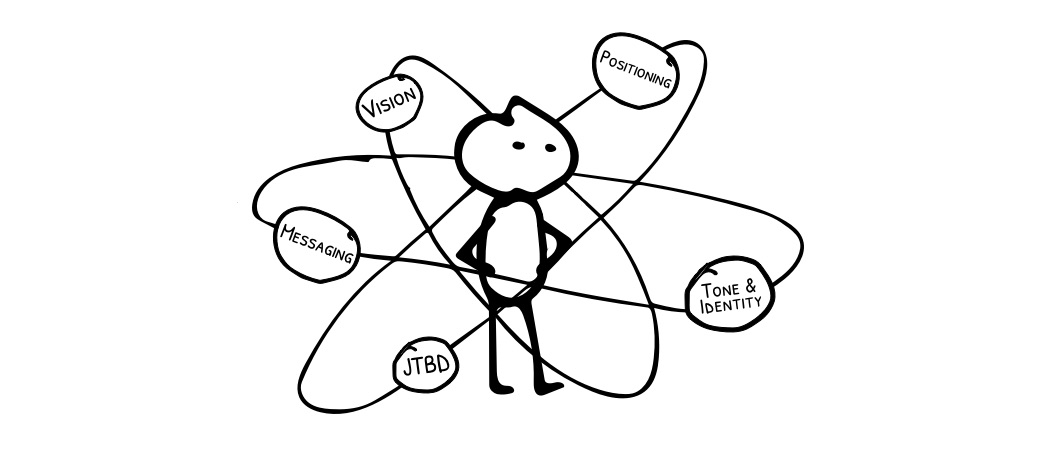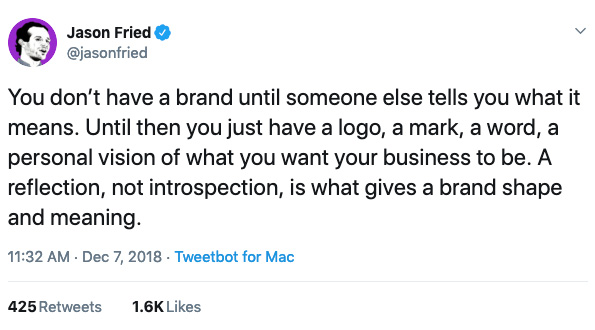
There are a lot of words and concepts that come to mind when we think about “Brand”.
- A promise
- Your reputation
- An experience
- A mental shortcut
No matter how you choose to describe it though, these ideas all hinge on one common element: your customers.
That list could be rewritten as:
- A promise made to your customers
- Your reputation in the minds of your customers
- An experience provided to your customers
- A mental shortcut to help your customers remember you
With this in mind, everything you do as a business to develop your brand should center around how you connect and engage with your target customers.
The challenge of course is that you can’t control how customers will interpret what you do.
As Jason Fried of Basecamp points out, on some level that interpretation or reflection is everything. Because your customers determine the value and success of your business, their opinion on your brand is all that matters.

What’s missing from that tweet though is that customers are reacting to what you’ve created.
From what I’ve read about Basecamp, they gave very little thought to this in the early days. They made products, put them out there, and let people interpret their work as they will.
That’s the default path for a lot of businesses: come up with an idea, share it, and wait for the market to determine its value…and your brand.
The problem here again is the implication that because your brand lives in the mind of your customers, that this means your business has no power in the equation. That you shouldn’t spend any time crafting your brand because it’s out of your control.
That type of thinking can at best slow down your progress and at worst create unnecessary obstacles on your path.
Will Customers See, Remember, and Trust You?
The competitive landscape is only getting noisier. Customers are getting more sophisticated in their evaluations of businesses.
As consumers we used to get a majority of our reps evaluating companies from TV and out in the world.
But now we’re mainlining our brand exposure.

According to a 2018 Nielsen report, adults are spending 11 hours every day looking at screens.
Whether it’s on social, YouTube, Google searches, or good old fashioned TV, we’re in a near constant state of engagement with new products and services.
In the past, maybe you could get away with a slower iterative cycle of feedback to develop your brand. But with all that noise, there’s an even higher premium on each customer interaction. If you get the opportunity to grab someone’s attention, you need to make it count.
This is why a customer-centered brand is critical.
It gets you focused on understanding your customers as much as possible and then using that information to inform how you present your brand.
It gets you to improve alignment between how you see your business and how customers see it.
It builds trust through the consistency of what you say and do.
It helps reduce the space between you and the customer.
Yes, you will always need feedback from your customers. Yes, your brand will evolve as you see the response from your audience and learn what they care about most.
But there are actions you can take today to speed up that process, and build stronger more effective relationships with your customers.
5 Questions For Your Brand
Here are 5 questions for your business to consider in order to build a customer-centered brand:
- Vision: How will your customers lives change if you’re successful in what you set out to do?
- Jobs To Be Done: What are the circumstances when your customers need your business, the motivations they have to use your business, and the outcomes they seek as a result?
- Positioning: Which elements of what you offer will create a unique place for your business in the competitive landscape, as well as in the minds of your customers?
- Tone & Identity: How will you communicate and present your brand so that it speaks to what your customers value?
- Messaging: What are the words you’ll use to convey what you provide and encourage customers to switch from whatever they do now to engaging with your business?
And there are 3 outcomes you can expect as you improve the answers to those questions:
- Clarity around who your customers are and how your business can best connect with their needs.
- Focus so that all the effort that you and your team put in work toward the same specific goals in the same way.
- Consistency in all the ways your business expresses itself, so that customers can establish expectations and trust around what you provide.
Taking some time to think through these questions can help a startup create a more effective launch or propel a veteran business to new growth.
No matter how long you’ve been around, your brand can always benefit from getting more centered around your customers.
Create Your Own Customer-Centered Brand
Want help creating a customer-centered brand for your business? Learn more about creating a Brand Guidebook for your business to get the clarity, focus, and consistency you need to develop a profitable brand.


